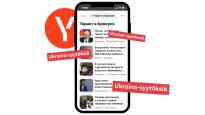President of Russia Vladimir Putin has sought to link Ukraine to last Friday’s terrorist attack in Moscow. At least 139 people died in the attack on the concert hall.
Yesterday, Tuesday, tested the most commonly used search engine in Russia, Yandex, from Moscow.
“Теракт в Крокус Сити Холле”, i.e. “terrorist attack on the concert hall”, was written in the search field.
The search results displayed by Yandex on the mobile phone screen give an example of what an ordinary Russian can see when looking for information about a terrorist act.
At the top of the Yandex results are claims about Ukraine’s share
All links provided by Yandex led to Russian media sites. Russian media cannot operate freely. State media channels are practically the mouthpieces of Putin’s regime.
In three of the first five search results provided by Yandex, allegations emerged that Ukraine had something to do with the concert hall attacks. Only in one of these stories were the perpetrators described as extremist Islamists.
According to several experts, Russia wants to link Ukraine to the terrorist attack, for example, in order to increase support for Russia’s war of aggression in Russia. Ukraine has denied any involvement in the attack, and the Kremlin has not offered objective evidence for its claims.
Isis-K, a branch of the extremist Islamic organization Isis, claimed responsibility for the attack.
Yandex is the most commonly used search engine in Russia. According to various sources, 60–65 percent of online searches are made with it. The share of the American search engine giant Google is more than 30 percent.
Putin’s statements as the number one search result
The title of the story that comes to the top of the search results is “Putin: The preparers of the terrorist attack wanted to sow panic, but faced a united nation”.
Yandex works in slightly different ways than Google, which is most commonly used by Finns. Yandex offers a few line summary of each absolute news, with a few links to the original sources below.
If you open the link below the Putin abbreviation, you end up on the pages of the Russian channel RT, in the deep end of propaganda.
In the story, Putin claims that Ukraine had a hand in the attacks in Moscow. According to the story, he says that “the USA is trying to convince the rest of the world that there are no signs of Ukraine’s involvement in the Crocus hall attack”.
In reality The United States warned The Russian administration about the danger of an Islamist terrorist attack already two weeks before the attack. The Russian administration rejected the warnings.
In the story, Putin calls the Ukrainian regime a Nazi regime and claims that the attack could be part of a wider attack operated by Ukraine.
The EU banned RT from appearing on the territory of the Union two years ago because of the propaganda and disinformation spread by the channel.
Allegations of the perpetrators’ significant contacts with Ukraine
The second highest search result in Yandex concerns updated information on the number of victims. The summary does not mention possible perpetrators of the attack.
In one of the stories used as the source of the summary, instead, it is said that according to the FSB of the Russian security service, the perpetrators of the attack intended to aim for Ukraine. In addition, the story claims that the perpetrators had “significant contacts with Ukraine”.
None of this information has been verified by reliable sources.
In this video, journalist Aliisa Ristmeri explains what is known about the terrorist attack so far:
Youtube translation is also at the top of the search results
In the fourth Yandex search result, claims about Ukraine’s guilt appear right in the title. The source is the President of Ukraine to Volodymyr Zelensky advisor who resigned in January It would be Arestovych Youtube channel.
In the title of the article, it is claimed that Arestovych would have “slipped” Ukraine to be guilty of the Russian terrorist attack.
The story refers to one stumbling over the words in a video interview lasting just under two hours. No specific point in the interview or any other evidence is presented to support the claim.
Russia has previously used Arestovych’s YouTube channel in its propaganda.
Not one word is mentioned
In two of the first five search results, no opinion was taken on who could be behind the attack.
They deal with the arrest of the eighth man suspected of the attack on Tuesday, as well as the backgrounds of the previously arrested men.
The stories listed by the Yandex search tell, for example, about the family situations of the arrested and the thoughts of their neighbors. On the other hand, they do not mention a word about the suspects’ possible radicalization or terrorist connections.
The word “Isis” is not mentioned in any of the stories at the top of the search results or in their source links.
The Yandex search was done in Moscow on Tuesday, March 26. The search was made in a private browsing window, which does not store user information.
